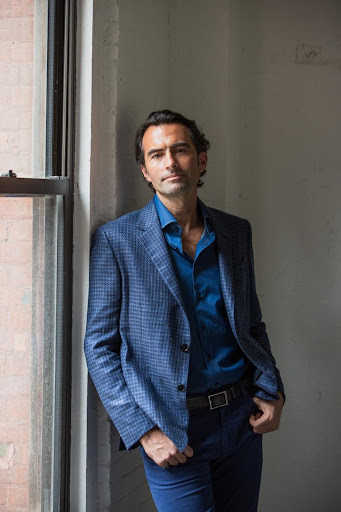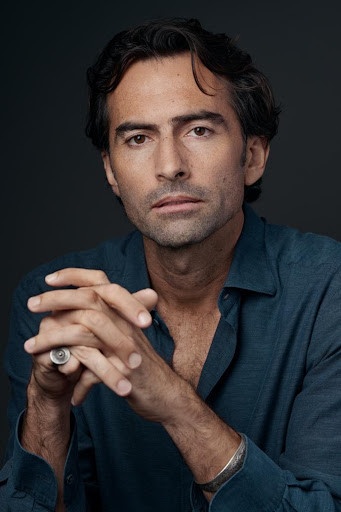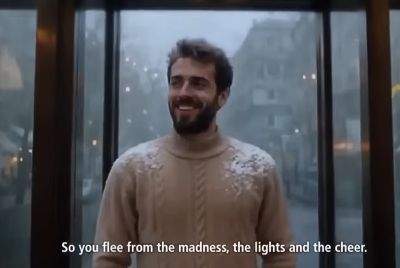Life Calling: The Illustrious New Movement Tasked With Rescuing Us From The Tyranny Of Tech
John Mack is a man on a mission. Having spent the last two decades working as a photographer in Mexico, France and most recently Spain, Mack is now swapping the photography life for an altogether different one. He has become an author, poet and campaigner during the inexorable rise of technology, who wants to wake up the human race before it sleepwalks into total digital enslavement.
Not only has he founded his own initiative, Life Calling, whose mission is 'preserving our humanity in the digital age', but his immersive art exhibition and awareness-raising forum A Species Between Worlds: Our Nature, Our Screens will run for the whole of September in New York City.
It will bring together the most influential and prominent voices at the forefront of concerns about the digital world and include keynote speeches and conversation from an impressive line-up including Tristan Harris, who took part in the hugely successful Netflix documentary The Social Dilemma, Facebook whistle-blower Frances Haugen, Jonathan Haidt and David Chalmers.
This was certainly not the path that the son of Wall Street giant, former Morgan Stanley CEO and Chairman John J Mack was expected to take, but it isn't the first time that younger Mack has confounded expectations, having turned his back on a predicted career in finance to work in a variety of jobs: as a producer's assistant in Antarctica, a New York City bartender and a street photographer in Mexico.

After years living the relaxed, bohemian life of a comfortably off street photographer, a sudden, unprompted epiphany about the nature of reality transformed himself and his outlook on the world, giving him a new and vital purpose in life.
Returning to the US to, in his words, be 'at the forefront of the battle to defend human awareness in light of the encroaching digital landscape' will be no easy task, but Mack is more than up to the challenge. His impressive contacts book, networking skills and sheer determination has transformed what could have remained an internal concern about the nature of the universe, into a serious social and cultural movement.Mack graduated from Duke University in North Carolina in sociology with honours and his obvious route was to follow his father into finance. But before taking up his post-graduation job in a boutique consultancy, he spent three months in Antarctica with film producer George Butler (who produced the Arnold Schwarzenegger documentary Pumping Iron) helping film a documentary on explorer Ernest Shackleton. The experience might have influenced what happened on his return to New York – which was to last exactly two weeks in his city job.
'I remember arriving straight after work to a family dinner with my suit and tie on, and my father being so proud I was arriving late because I was working,' Mack recalls. 'I quit the very next day.'
By his own admission, the next year wasn't such a great trajectory. 'I became a bartender in New York City for about two months, was fired, and then just got lost and confused,' he says. 'I didn't have any real direction.'
In his spare time Mack discovered a love of photography, and it was Butler who suggested he did a photography course in Mexico with acclaimed black-and-white photographer Mary Ellen Mark. Mack duly headed off to Oaxaca and did a one-week course shooting an indigenous Mayan village.
'I really took a liking to it,' recalls Mack. 'It was a life full of simplicity and beautiful moments. It wasn't an escape as such, but it was such a contrast to my life in New York. I could really get down to basics and better understand the beauty of simplicity, the awe in the spontaneous, the freedom in the makeshift.'
It was in a local café that Mack struck up a conversation with a German woman who was having coffee alone – the couple lived together for three years before getting married. After their daughter Lucia was born, the family moved first to Arizona and then Aix-en-Provence in the south of France for five years, later moving to Seville in Spain where Mack still lives.
Mack started to make a name
for himself in photography, publishing Revealing Mexico, a collection of images from his years there published to coincide with the Bicentennial of Independence (2010), and a book from his time in and around Marseilles and Aix-en-Provence. Nothing in Mack's life apart from a love of retro technology such as vinyl records and hand-crafted board games pointed towards a sudden, almost revolutionary change in outlook, but in April 2014, as he puts it: ''Everything changed.'
So what happened?
It began, as these things do, in a tiff with his spouse. As he tells it: 'Though beautiful, my marriage was an emotionally taxing relationship that revealed to me how little I knew myself. For this, I am forever grateful to her, for it was with her words that, in April of 2014, at the age of thirty-seven, the light changed when she stated: "The only reason you're so angry is because you're giving me your power to decide whether or not you're free." '
These words changed everything for Mack. "I fell silent," says Mack. "The entire world before me seemed to come together, as if I had moved from a positioning underground to a positioning above ground. I looked at her, as if seeing her for the first time, mesmerized, and simply said, 'You're right.'" "My world shifted. I was transfixed and in awe of the objects in the room—objects that had always been there, yet objects that I had never really seen before. The colours, the shapes, the geometry of it all. Not quite sure what was happening, I decided to stand up. Walking down the stairs to the first floor—on my way toward the door that opened to the backyard—I realized that the world of suffering had instantaneously vanished. That suffering, disguised at times as 'happiness' and visible at times as unhappiness, became the stamp of the entirety of my life before this moment. I knew that I was 'done,' but I wasn't too sure what that meant. I guess I could say that I was finished with the me that I had never been to begin with. Was it that I was no longer John Mack, or was it that this was my first time being John Mack? Not knowing what to expect, I opened the door to the backyard terrace and stepped out of the house toward the outdoors. As for what I saw, I will not attempt to bring the indescribable down to the describable. What I will say is this: There is something occurring right now, in this very instant, all around us, that is so mind blowing that to open one's eyes to it, even if just for a moment, would shatter one's perception of life forever. Put simply, I saw—with utmost clarity—the boundary which separated reality from illusion. Some people call it an awakening, a transcendence, an enlightenment, or a shift in consciousness."
The result of this epiphany was that Mack suddenly became very clear about reality and illusion and how our current use of technology was playing a crucial role in further solidifying the prison of the mind.
"The problem isn't technology on its own," he says, "but rather the abdication of our power to that technology. In the same way that I built my own prison by abdicating my power to someone outside myself, so too has the human abdicated its power to the device. Smart devices are supposed to be our tools, but when we abdicate our power to them, they become our reality and we become their tool. There is a role reversal at play. We are giving technology the power of God.
"Once you're out of the dimension of illusion, you then see not only where you were stuck, but you see where the human as a collective remains stuck. It's a construct that we've all agreed to, and once it's broken you see the glue that binds everybody to that illusory construct, and I saw very clearly that if this construct is not transcended, the human will become all the more machine-like."
Having had this revelation, Mack was then tasked with delivering on it. "I had an awakening and it just completely revamped everything about my life. I now feel like I am tasked with providing clues of reflection to assist others in discovering their own abdications of inner power."

Specifically, Mack sees illusion as anything that has replaced reality. "The human psyche-device operates like a smart device. It has a programmed software, or memory, that dictates how we see the world. We project these constructs over the natural world without realizing the projection. In a sense, we are performing augmented reality, and today's digital technology is merely revealing the inner workings of the human psyche, the artificial environments of the mind.
Once you free yourself of such illusory projections, only then can you truly see things how they really are. "That's the dimension that I shifted to," says Mack. It wasn't a way of looking at the world, but rather looking at the world in no way at all."
Dealing with the impact of what he had experienced took several years. "I had to sit with it for a while and research what was happening to me," says Mack. "It turns out that it is really is no big deal. I found stories of many others who have experienced the same."
Coincidentally or not, Mack divorced a few years later. Two years after his revelation, Mack was back in Mexico and read about a Pokémon Go stampede in Taipei where hundreds of people were flooding across an intersection chasing after a rare Pokémon and he thought: "Wait a second – these are all people who are chasing an illusory construct, a figment of their mobile device's imagination and I saw right there that the Augmented Reality of Pokémon Go runs analogous to illusory projections of the mind."
Mack had a new life calling – hence the founding of his initiative. He wanted not only to visually capture this replacement of reality, but to reverse its effects, by raising awareness of what is happening inside our brains. "What," says Mack, "can the phenomena of digital algorithms teach us about the psychological algorithms of the mind?"
To capture the replacement of reality by illusion, of the natural by the artificial, he decided to travel to some of the most beautiful and iconic landscapes on the planet and take photographs of their natural state and their digital simulations, as rendered by the Pokémon Go geolocation app. He travelled for four years, covering the seven natural wonders of the world, including Mount Everest and Victoria Falls, and to over 50 US National Parks.

"I took two photographs at each site – how it looked in reality and how that same landscape looked in the simulated AR environment of the Pokémon Go projection." The flat, barebones graphics of the Pokémon Go projection symbolize the current, widening divorce from the world of nature.
The photographs form the centre of his new exhibition, A Species Between Worlds: Our Nature, Our Screens and is part of Mack's mission to 'reverse' the augmented reality, or illusory projections, in which we live.
"The twist in the exhibition is in the very AR app that I have designed. With virtual landscapes hung on the wall, the smart-device's AR app reveals the natural landscape on the screen. I'm therefore reversing the AR equation. Again, I am not anti-technology. On the contrary," says Mack, "what I am proposing is that in the same way the reverse grip of a hammer can take out a nail, or how the reverse twist of a screwdriver can take out the screw, can these devices be held with a reverse grip, so to speak, to undo the damage they are causing?" "That, to me," he adds, "would be the epitome of all tools. In other words, can they be used not only to reveal the illusions of the smart-device, but also the illusions of the mind?"
A Species Between Worlds: Our Nature, Our Screens is just part of everything he hopes to achieve with his overall initiative, Life Calling. He wants to travel the world with the exhibition – particularly to take it to Tokyo, home of Pokémon – but the ultimate goal is to build a following as a thought leader on the topic of consciousness and the trajectory of humanity in the digital age.
Only then will Mack launch his 'true baby', the ambitious Consciousness Positioning System (CPS) which, in the same way that GPS maps the outer environment, the CPS maps the inner environment and pinpoints you within that landscape. Running alongside the CPS will be Awareness 101, an academic course about consciousness which will shed light on the virtual realities of the mind and the path to illusion-free perception.
Mack sees the digital trend as an existential threat, the annihilation of our humanity as we know it. Mack says that in the same way pollution of the outer environment is reaching a climactic tipping point, so too is the digital pollution of our inner environment reaching a humanity tipping point. Mack hopes that, in the same way that climate change and global warming are universal topics where the adjective 'green' is a widely-understood synonym for being environmental-friendly, there will in the future be a similar concept: "Wouldn't it be great," says Mack, "if the 'global warming' of our inner environment reached such global concern that we could assign the color 'blue' to tech-responsible companies and products?"
He isn't alone in his crusade to minimise the control technology has over our lives: speakers at A Species Between Worlds: Our Nature, Our Screens include not only the afore-mentioned Tristan Harris, Frances Haugen and Jonathan Haidt but also Yuval Noah Harari, author of Sapiens: A Brief History of Humankind; Stanford University Professors Rob Reich, Jeremey Weinstein and Mehran Sahami on their book, System Error: Where Big Tech Went Wrong and How We Can Reboot and a panel on the State of Social Media.
"To raise awareness is of extreme urgency," says Mack. "Technological progress is only going to increase exponentially, and the more we rely on technology the deeper we must connect to our humanity. The digital takeover of human consciousness is happening as we speak. And the problem is that tech is becoming so sophisticated that we're on the path to reaching a point where there's no turning back. Time to wake up."
A Species Between Worlds is open to the public, free of charge and is only open for the month of September 2022, so be sure not to miss out. It is a 17,000 square foot exhibition, accompanied by a robust program of talks and events through the month of September.
A Species Between Worlds Forum will combine thought-provoking artwork with an inspiring program that brings together a unique group of high-profile speakers and leaders from the fields of art, academia, technology, and business to explore the nexus of new technology and human behaviour through a multidisciplinary lens.
For more information see below.
A SPECIES BETWEEN WORLDS: OUR NATURE, OUR SCREENS
537 West 27th Street
New York, NY 10001





















